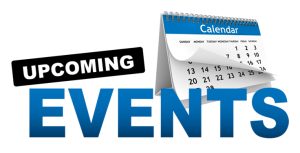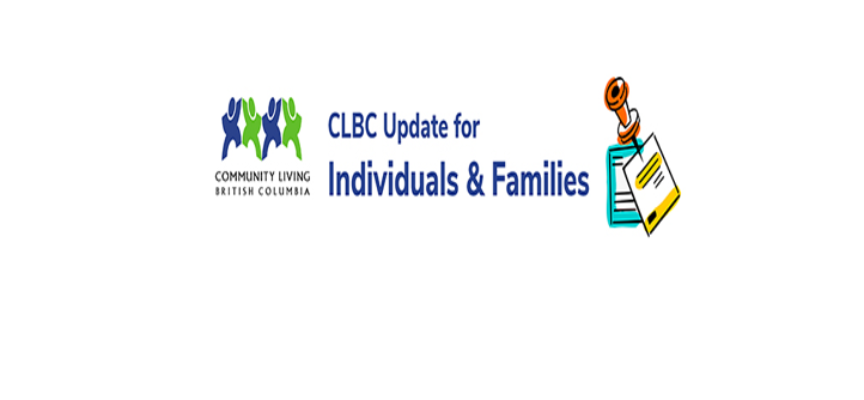| Welcome to the March 2023 edition of CLBC’s Update for Individuals and Families.
As a reminder, you can find all Updates (including past editions) posted on our website here. You can also check out CLBC’s Facebook page here and Twitter page here. If you know of anyone who would like to receive future Updates, please share the link to our sign up page with them. If you have a specific question, or feedback about this update, you can send an email to CLBCInfo@gov.bc.ca.
CLBC and Government News
Core individual and family support funding increases in Budget 2023
 CLBC is pleased with the commitment made to people with developmental disabilities and their families in the B.C. government’s 2023 budget. Budget 2023 will allow CLBC to maintain existing services, provide new services for transitioning youth, and increase core individual and family supports. CLBC is pleased with the commitment made to people with developmental disabilities and their families in the B.C. government’s 2023 budget. Budget 2023 will allow CLBC to maintain existing services, provide new services for transitioning youth, and increase core individual and family supports.
CLBC will have a budget of $1.45 billion in 2023/24 to serve 28,000 eligible individuals.
Budget 2023 includes $3.1 million for CLBC to increase core individual and family support funding. This is standard minimum funding available to individuals and families that can be used flexibly for wellness supports (formerly called respite) or contracted services. Beginning April 1, 2023, this funding is increasing from $300 per month to $350 per month (or $3,600 per year to $4,200 per year).
The provincial budget also includes an increase in funding to the Ministry of Social Development and Poverty Reduction to increase the maximum shelter rate of Persons with Disabilities (PWD) income assistance from $375 per month to $500 per month effective July 19, 2023. The increase in the shelter rate will also help home sharing providers and agencies who operate staffed homes to meet increased housing costs.
Click here to find more information about Budget 2023.
Government wants your input on its poverty reduction strategy
The Ministry of Social Development and Poverty Reduction want to hear ideas from British Columbians on how to update TogetherBC: B.C.’s Poverty Reduction Strategy. Whether it’s ideas about how to make more progress on poverty, or suggestions about how to change legislation to better serve the people of B.C., everyone’s perspective is welcomed.
The engagement process includes a public survey, small group sessions and virtual town halls and runs until April 14, 2023.
Click here to learn about how you can share your ideas on B.C.’s strategy to reduce poverty.
Inclusion BC film highlights inclusive employment stories in Campbell River
As part of its Employer Outreach and Challenging Misconceptions projects, Inclusion B.C. has released its first short film, Inclusive Employment: Stories from Campbell River, B.C.
Created in collaboration with Rivercity Inclusion, the film explores stories of employees, their families, community members, colleagues, and employment support professionals who are working towards a future in which workplaces include people of all abilities.
Watch Inclusive Employment: Stories from Campbell River, B.C. here.

February 7 COVID-19 teleconference video recording and plain language summary now available
On February 7, a teleconference for individuals and families took place with Dr. Daniele Behn Smith, Deputy Provincial Health Officer, and John Stinson, CLBC Vice President of Service Delivery and Innovation, to share the latest COVID-19 updates and address questions. The meeting was moderated by Michael J. Prince, CLBC Board Chair.
The video recording of this teleconference, along with a plain language summary, are now available on the CLBC website here.
Share your story with a CLBC Strategic Initiatives Advisor
Strategic Initiatives Advisors David Johnston and Michelle Goos are CLBC staff with lived experience currently leading projects that involve learning from others who live with the label of an intellectual or development disability.
Michelle’s project is called Supporting Parents with Diversabilites. Michelle is a parent herself who is looking to learn about the experiences of other parents with disabilities. She will be collecting stories to learn about what works and what doesn’t and what supports would be helpful. David’s project is called Options to Participate and Belong in the Community. David is looking to understand what has helped adults with developmental disabilities to get a job, make friends, or belong in community like any other citizen. You can learn more by watching Michelle’s invitation video here and by watching David’s invitation video here.
People who participate can share their story in a one-on-one interview (in person or online) or through small group guided reflection sessions. The people interviewing and leading the sessions will have lived experience themselves. Any private information that is shared will be kept private. After the sessions, the overall things that were learned through the sessions and interviews will be shared to create a better understanding about what worked and what didn’t work, as well as what would help better support people with lived experience.
For anyone sharing their story, the key learnings from your interview or group session will be summarized with you right at the interview or group session to make sure it has been captured correctly.
If you, or someone you know, is interested in sharing your story with either Michelle or David, you can contact them directly using the information below:

Get to know your local CLBC Community Council
CLBC Community Councils are groups of self advocates and family members who receive support from CLBC, as well as community partners and allies who care about building culturally safe, accessible, and inclusive communities. There are 13 Community Councils around the province.
Community Councils provide a regular gathering place for individuals, families, community organizations and members to exchange information, share stories, host presentations, and make new friends.
Together with community, Councils strive to:
- Build relationships with local community leaders working to create a more inclusive B.C.
- Connect communities, people, and families to information, resources, and each other
- Listen to the experiences of people and families served by CLBC to make things better
- Collaborate on actions that lead to social connections and inclusive community opportunities for people with developmental disabilities
For more information, visit the CLBC Community Councils webpage here or contact Jessica.Humphrey@gov.bc.ca.
Self Advocacy Corner
 Get connected with events hosted by self advocacy groups around B.C. Get connected with events hosted by self advocacy groups around B.C.
Self advocacy groups are leading social connection activities in communities around B.C. Find more information about how you can participate below:
Speak up for what you want in life with People Planning Together
The Empowering Self Advocates To Take Action (ESATTA) Co-op is coming to Terrace on March 14 and 15 to deliver their free two-day training called People Planning Together. This training is for people labelled with a developmental disability who are interested in taking a leadership role in planning a life they desire. It is facilitated by people who also live with a label of developmental disability.
During the training, participants spend time identifying the things that are important for them to be happy, healthy and safe. It’s about deciding what works for you and how people can best support you. Here are the details:
When: Tuesday, March 14 and Wednesday, March 15 from 9:00 a.m. to 3:00 p.m. (PDT)
Where: Thompson Community Services, 3242 Kalum Street, Terrace, B.C.
Click here for more information about this People Planning Together training, including registration details.
Karaoke party coming up in Surrey
Self advocates of Semiahmoo in Surrey will be hosting a Karaoke Night on Thursday, March 16 from 6:00 to 9:00 p.m. (PDT). There will be prizes for best singer, best group performance and best dance moves.
For anyone interested in attending, please RSVP by email to sas@uniti4all.com.
Get down and boogie in Kamloops
The Speaking Up for Self Advocacy (SUSA) Society is hosting a dance party and inviting anyone who is interested to get down and boogie with Tracy Jo.
The event takes place March 28 from 11:00 a.m to 12:00 p.m. (PDT)
If you’re interested in joining, you can call 250-572-6009 or email speakupkamloops@gmail.com.
Have your say in the Speaking Up for Self Advocacy Spring mini-conference
Do you live in or near the Kamloops area and want to connect with other self advocates?
The Speaking Up for Self Advocacy (SUSA) Society is working with local agencies to bring a Spring mini-conference to Kamloops. They want to make this conference great and need your help.
Complete the survey linked here to provide your input on planning for this conference.
SIXPO festival events taking place throughout April
 SIXPO (Sexuality, Inclusion and Exploration) is a festival organized by and for people with disabilities to discuss, reflect and learn together about all sorts of topics related to sexual wellness. There will be panel discussions, speakers and workshops along with plenty of opportunities to engage in conversations with peers and experts. SIXPO (Sexuality, Inclusion and Exploration) is a festival organized by and for people with disabilities to discuss, reflect and learn together about all sorts of topics related to sexual wellness. There will be panel discussions, speakers and workshops along with plenty of opportunities to engage in conversations with peers and experts.
SIXPO is for folks who want to learn more about sexuality, and especially for people with lived experience of disability and those who support them. Wherever you are in your relationship to sexuality, we can all benefit from learning together and exploring these topics a little more.
Online events will be happening from April 1 to 20 with in-person events at Heritage Hall in Vancouver from April 20 to 22. Visit Sixpo.ca for more information. On the website, you can also submit questions and suggestions, and sign up to receive updates about the festival.
Staying Supported and Connected
Sharing trauma-informed awareness: Reflecting on the lives lost in the Tseshaht Nation
Written by Jody Bauche, CLBC Indigenous Cultural Safety Coordinator
WARNING: This story contains distressing details.
On February 21, 2023, the Chief of the Tseshaht First Nation on Vancouver Island said that ground-penetrating radar had detected 17 suspected grave sites around the property of the former Alberni Indian Residential School. The Nation said its interviews with survivors, the historical records and other documents also show that 67 students died at the school, many of them from medical conditions. As stories like this continue to emerge across Canada, it is important to pause and reflect on this colonial history that is ongoing.
Hearing this news can be upsetting and it can cause alarm to those that are directly and indirectly impacted by this trauma. Some important considerations for those who have loved ones that are affected by this news:
- A traumatic response should always be considered with care. Everyone has their own threshold for how they process emotionally triggering events and it’s important to acknowledge when people experience trauma.
- Hearing this news can trigger other traumatic experiences people may have experienced in their lives. Be mindful of what people might already be going through and honour what it is they need to be well.
- Trauma is not something that goes away easily. It is something that lives in the cells of our bodies. If you know someone who is experiencing emotional and physical symptoms related to trauma, it is best to encourage them to talk to a professional that they trust.
Fraser Health shares new Easy Read resource for advanced care planning
Fraser Health has created a fill-in-the-blank booklet called My Voice In Action which guides the reflective process of advanced care planning. The booklet is a resource to start recording care planning thoughts and encourages further education and conversation. This booklet can be used by anyone across the province, not just in the Fraser Health region.
An Easy Read version of My Voice in Action is also available here. Easy Read is an accessible format that uses pictures and language that is easy to understand.
Tips for starting conversations about advanced care planning can be found here.
Connect with Vela and other families who are planning for the future
 Vela Canada assists people with disabilities to take greater control of their lives and live the life they choose by forming a Microboard or accessing Individualized Funding. Vela hosts weekly online video chats for people looking to learn from and connect with Vela and other families. Vela Canada assists people with disabilities to take greater control of their lives and live the life they choose by forming a Microboard or accessing Individualized Funding. Vela hosts weekly online video chats for people looking to learn from and connect with Vela and other families.
Register here to join the next Vela chat Planning for the Future, taking place on Tuesday, March 21 at 7:00 p.m. (PDT).
Tax clinics provide support with filing taxes
The Canada Revenue Agency (CRA) partners with community organizations across Canada to host free tax clinics where volunteers help to prepare income tax and benefit returns for people who have modest incomes and simple tax situations.
Learn more about these tax clinics, including eligibility criteria, by clicking here.
Click here to find a free tax clinic in your area.
Pathways offers family-to-family education course
 Pathways Serious Mental Illness Society is currently taking registrations for their free peer-led Family-to-Family Course. Participants in the eight-week course will learn about: different aspects of mental illness and how they affect the brain; current treatments and therapies; navigating the mental health system in B.C.; handling crisis; communication and problem solving; and much more. Pathways Serious Mental Illness Society is currently taking registrations for their free peer-led Family-to-Family Course. Participants in the eight-week course will learn about: different aspects of mental illness and how they affect the brain; current treatments and therapies; navigating the mental health system in B.C.; handling crisis; communication and problem solving; and much more.
The online course is delivered over Zoom and begins on March 23, running for 2.5 hours each week from 6:00 p.m. to 8:30 p.m. (PDT). It is led by trained Family Peer Volunteers who have lived experience of caring for a loved one with a serious mental illness.
View the Family-to-Family Course curriculum here. If you are interested in registering, call 604-926-0856 or email programs@pathwayssmi.org.
Stories and Celebration
Shine Together: Music video celebrates people’s abilities and inclusion in community
Torben Schuffert and friends in Smithers, B.C. recorded a music video for his original song Shine Together. The song is about recognizing people’s abilities and including everyone in community life.
Click here to watch the Shine Together music video.

Recognizing World Down Syndrome Day on March 21
Each year, March 21 is marked as World Down Syndrome Day (WDSD) as declared by the United Nations General Assembly in December 2011. On this day, people with Down syndrome, along with their families, friends, colleagues and fellow community members, organise and participate in activities and events around the world to raise public awareness and create a single global voice advocating for the rights, inclusion and well being of people with Down syndrome.
They share the important message “With Us, Not For Us” to show that people with disabilities have the right to be treated fairly and have the same opportunities as everyone else, working WITH others to improve their lives.
 Many landmarks around the world will be lit up in blue and yellow to mark the day, including B.C. Place stadium in Vancouver. Many landmarks around the world will be lit up in blue and yellow to mark the day, including B.C. Place stadium in Vancouver.
Learn more about International Down Syndrome Day on the United Nations website here.
To spread awareness and spark conversations, many people take part in the Lots of Socks campaign by wearing colourful attention-getting socks on March 21. Learn more about this campaign here and you can also find pictures of people wearing colourful socks, and share your own, by using the hashtag #LotsOfSocks on social media.
Visit the Down Syndrome Resource Foundation website for events taking place around the Lower Mainland and virtually.
Recognizing World Autism Awareness Day on April 2
April 2 will mark World Autism Awareness Day to celebrate and support people with Autism to lead full and meaningful lives as members of our communities. You can read more about World Autism Awareness Day on the United Nations (UN) website here and check back on this webpage for updates on events and activities taking place as part of the 2023 celebrations.
International Women’s Day was marked on March 8
 This past Wednesday, March 8, marked International Women’s Day. This day celebrates women’s and girls’ social, economic, cultural and political achievements and contributions. This past Wednesday, March 8, marked International Women’s Day. This day celebrates women’s and girls’ social, economic, cultural and political achievements and contributions.
Read the official announcement from the B.C. government here, with information about actions taken in support of gender equity.
Signing off
As we sign off on this edition, a quick reminder that for most of us in B.C. our clocks “spring forward” this weekend. On Sunday, March 12 at 2:00 a.m. the time moves forward an hour to 3:00 a.m. Until next edition…

|


 Click to listen highlighted text!
Click to listen highlighted text!